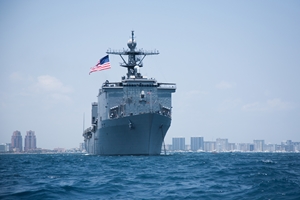Elite U.S. naval operatives see the Northwest region of the U.S. as providing an essential role for the military's expansion. According to Stars and Stripes, Adm. Harry Harris Jr. views the Northwest as a key site in future U.S. Naval endeavors.
Admiral thinks region absolutely essential
"The strategic value of the Northwest can't be overstated," said Harris, according to the source. "This is a huge center of gravity for the U.S. military. I think it's critical. That's why I'm taking time out of my schedule to come up and visit this area."
The U.S. government has sought a shift to the Pacific for numerous reasons. The most principal of these, according to Defense.gov, is that the Obama administration believes the U.S. is expending too much time and energy in other regions of the world. The source cites the Middle East as a region that the U.S. wants to incrementally withdraw from, establishing prerogatives and military benefits in other areas.
Buttress presence to placate animosity in region
The U.S. seeks to bolster its naval presence in the Pacific – Stars and Stripes reported that 52 percent of the Navy's surface ships are situated in the Pacific, a number slated to increase to 60 percent by 2020. The imbroglio's near the Pacific are what many see as the rationale for the planned increase in Naval resources.
China and Japan are currently in an bitter dispute over a set of islands, a clashing of dual rights that has raised tempers in the region. The U.S. recognizes the Japan's right to the islands, reflecting the alliance between the two countries who have reached a high-level of amity since WWII. Another reason for the shift to the Pacific is the fear that North Korea will continue to perform nuclear tests, menacing its democratic neighbor, South Korea.
"By now it is clear that the provocations, escalations and poor choices of North Korea's leaders are not only making their country less secure, they are condemning their people to a level of poverty that stands in stark contrast not only to South Korea, but every other country in East Asia," said former National Security Advisor Thomas Donilon, according to Defense.gov.
Stars and Stripes noted that other events have recently sparked the U.S' interest in the region, such as Vietnamese protesting directed at China and Thailand's declaration of martial law.

